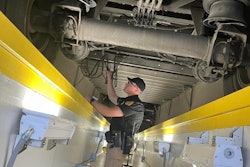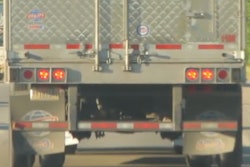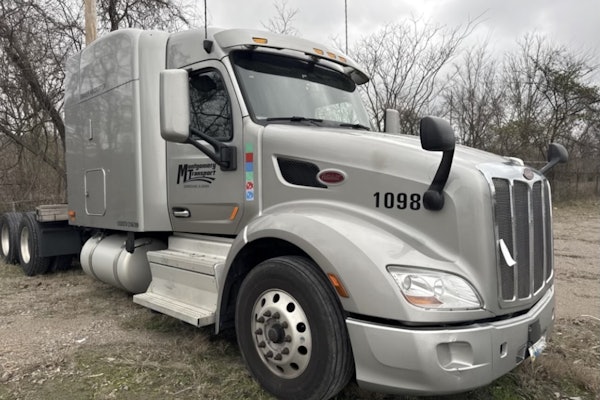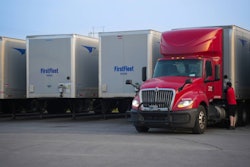Speaker 1:
CCJs 10 44 is brought to you by Chevron Delo, heavy duty diesel engine oil. Now there's even more reasons to choose delo, our major cash award lawsuits. Just to back door to more safety legislation for the trucking industry, you're watching CCJs 10 44, a weekly episode that brings you the latest trucking industry news and updates from the editors of CCJ. Don't forget to subscribe and hit the bell for notifications so you'll never miss an installment of 10 44. Hey everybody, welcome back. I'm Jason Cannon and my co-host. On the other side is Matt Cole. This month we've seen two nuclear verdicts and crash lawsuits against equipment manufacturers, Wabash and Western Star. Despite those pieces of equipment meeting widely recognized safety standards and regulations, a total award in those two cases is more than $600 million.
Speaker 2:
Nuclear verdicts are nothing new in trucking, but what makes these two cases unique and dangerous is that the plaintiffs also went after the manufacturer, not because the truck or trailer didn't meet a safety standard, but because that safety standard they claim wasn't high enough.
Speaker 1:
In the case of Western Star, an Alabama jury awarded a truck driver and a rollover crash, $160 million. The plaintiff claimed the lockout seat that was available for that model could have prevented his injury, and even though he didn't spec it when he had the opportunity, it should have been a required standard equipment.
Speaker 3:
I think the example I'm going to use as we talk about this is the recent case we saw against Daimler. This is a fascinating case. So in that case, you had another passenger vehicle. It was actually a work truck, but it crossed the center line. The driver on that truck made a maneuver and that maneuver caused the cab to flip. And in the process of the cab flipping, the cab collapsed, broke the driver's neck, and the driver was rendered quadriplegic. That driver sued the other carrier, the other truck, and they settled out of court. And that trucker also sued the manufacturer Daimler. And the theory behind that lawsuit is again, product liability anticipated use. And what the argument that prevailed in that case was that the trucker said, look, you have an option. There's an option for making the truck safer. There's a technology that you could have as an upsell that would prevent me from breaking my neck.
And because it wasn't legally mandated, I didn't get it, but you had it as an offer. You knew an anticipated use of this truck is it could roll over and if it could roll over and that's anticipated, you have some level of liability. That's really what's at stake is if you can anticipate how something is used. And I'll use, we'll go back to Wabash for a moment. The rear impact guard, what's the anticipated use for a rear impact guard Smashing into it. That's the purpose that maybe there's dock locks of other ancillary things, but it's to keep underwrites from happening. So as you look at the landscape for truckers and manufacturers going forward, what are the anticipated things that could happen with the objects that you own? And if it's something that is not being protected now, not legally required, now maybe that's not necessary to make those adjustments. This is the big fear I have is that we're going to move these goalposts to such an extent that my goodness, no one can operate a commercial fleet with the types of requirements we might end up seeing as a result of plaintiff attorneys and wrongful death and catastrophic injuries across the country.
Speaker 2:
We already have standards in place for things like rear underride, which is currently to prevent underride at up to 35 miles an hour in the Wabash suit. The plaintiff was traveling at 55 miles an hour when he struck the rear of a trailer being pulled by GDS Express. So at what point do we decide regulations are safe enough for underride crashes, which are not at all common with regard to truck involved crashes?
Speaker 3:
There's been about, I think 14,000 cases where someone has under ridden on a trailer across the country since they started collecting the data. And I mean, I dunno if there's any data around what is the average velocity that vehicle hit the back of that trailer and what should we be thinking about as regulators or as the industry of what level is safe? The reality is you're never going to make an underride that's going to prevent the super high speeds that are out there. If you could make something that could prevent 70 miles an hour, the weight and the cost of that for a trailer to be outfitted is astronomical. You probably couldn't do that at any reasonable scale. The question becomes what is the federal mandate? Is that the bare minimum? Is there requirements that could be higher or is the feds coming in and saying, this is what we say is safe regardless of what other states do?
There is a supremacy clause argument that no one's really made, and I don't think the feds have looked at it this way. We haven't had them weigh in on these cases obviously, but that is the challenge motor carriers are going to face because if you believe what the plaintiffs argued successfully in St. Louis, every single trailer, the 5 million on the road right now are defective right now. That's bananas. That's completely unreasonable. That's not an outcome that anybody should anticipate is being reasonable. So the hope is it gets overturned on appeal, but as we look forward, there's very few options for motor cures to do what is safe enough. There's really nothing other than comply with the regulations that are here. Maintain your equipment properly and maybe lobby, as we talked previously about the car companies making their vehicles safer to prevent under rides as opposed to putting it all on the trucking companies who have operating ratios that really can't afford to go any more than what exists on the federal regulatory landscape today.
Speaker 1:
Noteworthy here is that side underride guards, which are pretty heavy and expensive, have been on the regulatory radar screen for a while. They're not currently mandated in the us, but as Matt has made pretty clear, not having a piece of equipment that you're not legally required to have doesn't always offer a lot of protection from multimillion dollar lawsuits.
Speaker 3:
If you're a manufacturer and you just saw yourself or one of your cohorts get hit for four 62 million on something that was not legally required for them to have, now the question becomes, alright, are we going to start anticipating the accidents of the future? And we're in the most distracted society that has ever been. People have computers supercomputers in their pockets and they're looking at them as they drive. And as you anticipate people making very dumb decisions or very careless decisions as a manufacturer, you start making the question of, am I fighting this battle the right way? Am I going after the regulator saying it's expensive, it's heavy, here's my issues, or is there something else we need to think about is what are the states going to do? Well, will a jury look at me and say, well, you've known for 20 years that side under rides are happening and you've done nothing to stop it.
And that is where that becomes really scary for the motor carrier. There's no obligation to do that. You're not going to get hit for strict liability because you did an install. So it's not legally required. What does happen I think, is if you see that strict liability case be successful, you see the trends start moving in that direction, now you're kind of on notice. Now you have to think, am I specking this equipment properly? Am I doing what I'm supposed to do? And that burden of that negligence claim, which is again, it's a duty to do something, it's the breach of the duty to do something that causes some sort of damages. So if you're a motor carrier and you see, let's take a fake number, 15 side underride cases that get found to be liable for what's happened, what do you do? Do you now have to retrofit your fleet even if the feds don't require it?
You look at the case of Wabash, you look at the case of Daimler and you start understanding the plaintiff attorneys are going to target the manufacturers. And if you're a motor carrier and you see this stuff, you may be on notice to make some big changes. I would urge any motor carrier and any manufacturer consult your attorneys, understand the risk as you see if the appellate process might ultimately vindicate Daimler, ultimately vindicate wabash. But it is a scary situation and we don't need the feds to act on mandating side under rides if we come to a place where jurors expect it, if it's an anticipated use of the product
Speaker 2:
Side. Underride guards are not legally mandated in the US but have been mandatory in Europe for all trucks, trailers and semi trailers since the eighties and in Asia since the seventies.
Speaker 3:
The rest of the world does things very different than we do. We're a far more fragmented supply chain than they're, they're far more consolidated from my experience on how motor cares behave. So they have more operating margins typically to invest in these types of technologies. I think that as consumers, people who buy anything, if we see these trends continue in America and these things become mandated or expected to be mandated and that arguments are persuasive at the courts, everything will cost more. Everything will cost substantially more than it cost today because you're talking about three or 4 million commercial vehicles, class six, seven, and eight, you're talking about 5 million trailers on the highway, and if you just mandate at the manufacturing level that does not do anything to prevent the vast majority of assets out there, so you're probably talking about retrofitting and that's going to be substantial.
I do think passenger vehicles need to be held to another standard. Presumably the crash avoidance systems that are out there are going to be better over time and maybe they can manufacture these things in a way that prevents under rides. But yeah, I think your point about rest of the world doing it that way, that might be part of the calculus that ends up going into this. Whether the feds mandated or not, maybe manufacturers start making those changes. And just to highlight the Daimler case again, if you make the option as something that's safer and you still lose because people didn't choose the option, do you make it an option? Do you just require it? I dunno, but that again makes everything cost a whole heck of a lot more.
Speaker 1:
The two manufacturers in cases like this, specifically Wabash and Daimler in the two instances that we're discussing here are the primary targets because they have deep pockets. But Matt says, fleets should be paying attention to what's going on. And he tells us why. After a quick word from 10 44 sponsor Chevron lubricants,
Speaker 4:
We serve customers from Birmingham, Alabama to the Gulf Coast, so our people and our trucks are booked solid all day. There is no slack in our schedules. These trucks can't break down. I choose an engine oil that takes care of the number one issue with our engines emissions, so we don't have to worry about DPF clotting. I choose the engine oil that keeps our trucks hauling. I choose Delo 600 A DF.
Speaker 3:
The first people that will be held liable for not having side hunter ride on a trailer are not going to be the motor carriers, it'll be the manufacturers. If anyone is found liable, anyone is found liable for that failure. It would be or alleged failure. It would be the manufacturer. So your job as a fleet manager is to spend a lot of time following trends, whether it's attri or other publications to understand what is happening. US Chamber of Commerce has a ton of information about this stuff too. Follow the trends of what's going on As time goes on and you're looking at evaluating different systems for your side skirts, maybe there's a conversation to be had about what other options are out there for your fleet specifically. But to your point, I dunno that a fleet manager needs to do anything right now as it relates to side underride protection because again, it's not legally mandated.
No manufacturer to my knowledge, has been held responsible for not having it. So I think it's more of a wait and see thing. But for those rear impact guards, what we talked about previously, DS allegedly had a bunch of rust. So that's a defense for manufacturers. Say, look, we designed it well and they just didn't maintain it. But if you're a motor carrier and you have rear impact cars and you just aren't maintaining them or you're just putting some paint on there and some new tape, maybe that's not the best option. Maybe you want to have someone else look at it to ensure that it's meeting what is existing federal regulatory landscape for these things.
Speaker 2:
Money talks clearly and when big money is involved, lawsuits will speak louder than regulations. So are big money lawsuits the back door for legislation,
Speaker 3:
I look at the example of F four A preemption, you're not really getting into the broker liability necessarily, but the broker statute that enables brokers to operate is they control price, route and service. They don't control safety, so they're not responsible for when the motor carrier makes a mistake, but sometimes they're, and every single state uses the court system and the torts that are made, the product liability and negligent stuff as a kind of soft version of regulation. They're treated like regulation. So the duty of care and what you consider anticipated use, those are state requirements that are done through litigation. And so if you can't get federal action to make a mandate or to not make a mandate or whatever, that is an absolutely viable path to do that same thing. I like to look at it like when California with California Resource Board mandated the side skirts.
Many mega a decade ago or longer, most motor carriers didn't know if their trailers were going to go to California or not. Some of them did, but some of them didn't. So they made all the fleet retrofitted because California requires that it's a thousand a day fine if you don't do it right. So there are other ways to regulate these things that do not require the participation of the federal government, which is just how it's always been. So I think it is a pathway that may be something we should all be observing, and that's why I think it's important for every fleet to have a really good understanding of the risks that are in front of them. Work with the industry associations. They're a part of work with the publications that are putting out news because your ignorance of the law is not a defense. It simply isn't. You need to be proactive. You can't be reactive. But I think on the side underride mandate or requirement, we're still a long way away from that, but show me two or three big cases and maybe my opinion changes.
Speaker 1:
The national average for truck out of service violations is about one in every five trucks and minimum insurance levels haven't kept up with jackpot justice, and that's something that plaintiff attorneys are increasingly aware of.
Speaker 3:
We have very big challenges as an industry when it comes to vehicle maintenance and very big challenges as a result of under insurance. If you just pegged the insurance requirement that was done in 1980 to inflation, you'd have people running policies of 4 million or so. So there is some work to be done, and I think that we make ourselves an easier target when we accept, I would consider just mediocrity in our maintenance practices. So if you're a fleet, do not strive to be what the industry average is. If you're striving for that 21% out of service rate, please don't do better. You can do better. It's not the end of the world to downtime for a pm maybe a month or two earlier. Be proactive. That's the big thing I would emphasize. And the final piece I'd say is this is not stopping the TOR reform. Whatever people taught, it's not going to stop plaintiff attorneys from going after you, your manufacturers, every stakeholder in the value chain, and trying to find a way to make that person who's been injured whole, even if that person who was injured is 100% at fault for what took place. Because this is the nature of how litigation works in the United States.
Speaker 1:
That's it for this week's 10 44. You can read more on ccj digital.com. While you're there, sign up for our newsletter and stay up to date on the latest in trucking industry news and trends. If you have any questions or feedback, please let us know in the comments below. Don't forget to subscribe and hit the bell for notifications so you can catch us again next week.










